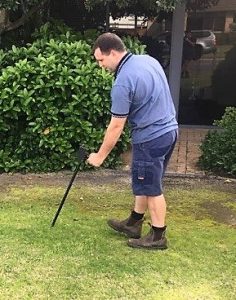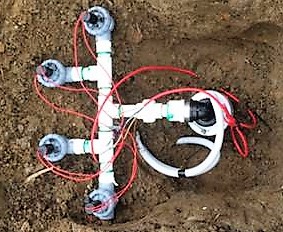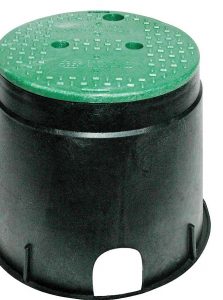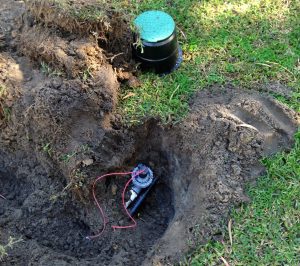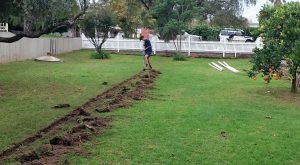Solenoid valve locating and finding broken reticulation wires – D.I.Y or Call us?
Finding lost solenoid valves or broken retic wiring is one of the most irritating tasks in fixing home reticulation. Without the right tools or a great deal of luck trying to locate a solenoid valve can prove very time consuming. We are happy to help and attend with a professional solenoid valve locating wand. Call us on 9246 0111 or request a reticulation service booking online and we will call you back pronto. Read further on towards the bottom of this page if you want to try and find the valve or broken wiring yourself first.
We have the latest tools to track and trace solenoid wiring and to find breaks in reticulation wiring and locate solenoid valves themselves. Our mobile service covers all areas of Perth. Whilst we are there we can service and repair any other reticulation issues you may have.
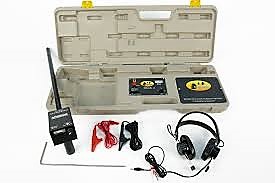
The latest tools maximise our chances of a quick result finding broken wires or lost solenoid valves.

Cable tracing wand means we can normally find all but the most elusive lost solenoid valves quite quickly.
We insert a ground stake directly into the earth which is then wired to our locating device. We than attach another cable to the wire we want to trace. Its then a matter of following the follow the path of the emitted audible beeps to track the wire. If a wire is cut or broken the beep stops there.
When we are looking for the solenoid itself the signal changes again. Headphones allow us to cut out background noise. The process can sometimes be made more difficult by other pipes or wires in close proximity giving conflicting signals. Excessive depth of wires or valves can also slow progress but generally it is a quick and easy high-tech solution.
Once the solenoid valve is located or we have found the broken wire it is then a matter of digging. Care must be taken whilst digging to avoid further damage to potentially unprotected wiring or solenoid valves.
How much does it cost to locate solenoid valves and broken wires?
We charge $115 callout including travel AND the first 30 minutes onsite. Normal reticulation service rates of $99 per hour then apply after the first 30 minutes. This is our standard reticulation service rate current for 2018. We do not charge anything extra for locating equipment rental or other hidden costs. Because we are experienced reticulation servicemen we can also repair the broken wires or replace the solenoid valve if requested. This saves you the cost of calling another tradesman back for the retic repairs themselves. We carry a good range of common spare parts and solenoid valves so can normally have your reticulation system back up and running quickly. Call Troy on 9246 0111 or 0408 454 130 to book or request a retic service online here and we will call you back.
What does a solenoid valve look like?
The actual valve is normally a black or grey plastic body with two wires going in to a small cylindrical coil on the top. Normally the wires directly onto the coil are both black or both red or one of each. About 200mm from the valve expect the wires to change to one black and one coloured (of any colour). Often the wires leading to the valve from the reticulation controller are sheathed in an outer protective sleeve normally coloured red.
What does the solenoid valve cover look like?

Sometimes solenoid valves covers are visible in the garden, These were found plumbed in to mains water from under the garden tap instead of near the water meter.
A few D.I.Y tips if you want to try locating the solenoid valve or broken wire yourself first.
Following are a few tips and ideas that may help you find that pesky solenoid valve that is either stuck open or leaking and won’t turn off.
If one station or zone of your retic is not coming on then most likely it is a problem with that station’s solenoid valve or the wiring going to that individual valve.
If more than one solenoid valve will not work, but others still do, then it is likely it is the “common” wire that feeds that group of valves There could be more than one common wire if another group of sprinklers still works.
If all solenoid valves will not work it could be the master solenoid valve or the common wire that feeds all valves. Of course if it is fed from a water bore, which is common in Perth, check that the bore is starting.
If a solenoid valve fails open then that station will be allowing water out each and every time any station is turned on. If the sprinkler system is fed from mains water and a master solenoid valve fails open, in conjunction with a station solenoid valve sticking open, then that group of sprinklers will stay on all the time regardless of whether the retic is turned on or off.
Ways to find solenoid valves without solenoid valve locating equipment.
First and foremost see if you have any irrigation or reticulation plans you may have been given by the original installer. Solenoid valves are normally indicated by a circle with a cross inside it making four quarters. Two of the diagonally opposite quarters will be coloured in black. Rarely will the valves actually be found exactly where they are indicated on the plan but it is a great starting point.
If your reticulation system is fed from mains scheme water then in the majority of Perth reticulation systems it will be plumbed in about a metre towards the house from the water meter. This is called a plumbers reticulation “cut-in”. Normally where it tees off from the mains water feed to the house you will find a mechanical isolation valve then a master solenoid valve that operates conjunctionally with each further solenoid valve. Sometimes the valve is just buried unprotected with no cover, sometimes the master solenoid valve has a square green lid but most commonly it has a round green lid either flush with the surface or buried 100 to 300mm under the surface. If you find an isolating ball valve or gate valve then, normally, just downstream of that is the master solenoid valve.
This mechanical isolating valve or tap is used to shut off mains water to the reticulation, but not to the house, and allows repair work on the reticulation to be carried out without shutting off the water meter.
Note that some isolating gate valves will have a red “wagon wheel” handle and when buried in moist sand these often become brittle and rusted over the years. Sometimes attempting to turn the valve breaks of the handle and a pair of multi-grips is called for to twist the shaft and hope for the best.

This main shut off valve pic sent in by a customer shows an unorthodox connection with the typical red wheel handle missing from the gate valve.

Here the plumber has installed the cut-in and retic isolation valve on the vertical pipe at the water meter (house side obviously!)
If your reticulation is fed from a water bore then you may find the information about how a bore is connected to a reticulation system found here may be useful.
There will be at least one further solenoid valve for each station or zone run by your reticulation controller. Most Perth retic systems have the solenoid valves in groups. One group or manifold for the front yard and one for the back. Normally these will be on the same side of the property as the water meter. Sometimes the solenoids are spaced separately along the main line front to rear as in the plan shown. Remember though, if the reticulation is fed from a bore there may be 2 or 3 solenoid valves joined together to run at the same time.
Sometimes the grass is greener around a buried solenoid valve and often it is slightly sunken. Sometimes where the trenches were dug for the pipes is also slightly greener or sunken. It can help to mow the lawn first to may it easier to see sunken or greener spots. Remember the garden and landscaping will likely have changed since the reticulation system was originally installed. Sometimes solenoid valves are found under paving or even concrete driveways.
Basic methods for finding solenoid valves-
- Dig and follow pipes back, going upstream from sprinklers
- Dig and follow pipes downstream from plumbers cut-in
- Dig and follow cables from reticulation controller (being careful not to cut them)
- Have someone turn your system on and off and listen for the coil activating or the water rushing through the valve.
Try cutting the bottom out of a paper cup or similar and during a quite time of the day or night listen against the ground whilst someone turns that reticulation station on and off at the reticulation controller. At the very least it’s worth looking at the expression on your neighbour’s faces!
You could try buying a chatterbox. This is a device that is temporarily wired in line with the valve you are looking for. Provided the field wires are not broken or have a bad joint, the chatterbox will make the solenoid valve faintly “chatter’ when operated making it easier to hear. Can be effective if the solenoid is still working and quite shallow.

Longer retic cable runs are normally in red sheathed multicore and often taped to the bottom of PVC main retic pipes.
Solenoid valves have low voltage 24 volt wires attached that are very easy to sever with spade or shovel and can be difficult to repair once broken. If you hit the actual solenoid valve whilst digging you may break it so take care. When exposing a valve first use a hand trowel and consider using a high pressure nozzle on a hose to clear around the actual valve.
Good luck. Feel free to call us if we can help further 9246 0111 or book a retic service online and we will call you back.

